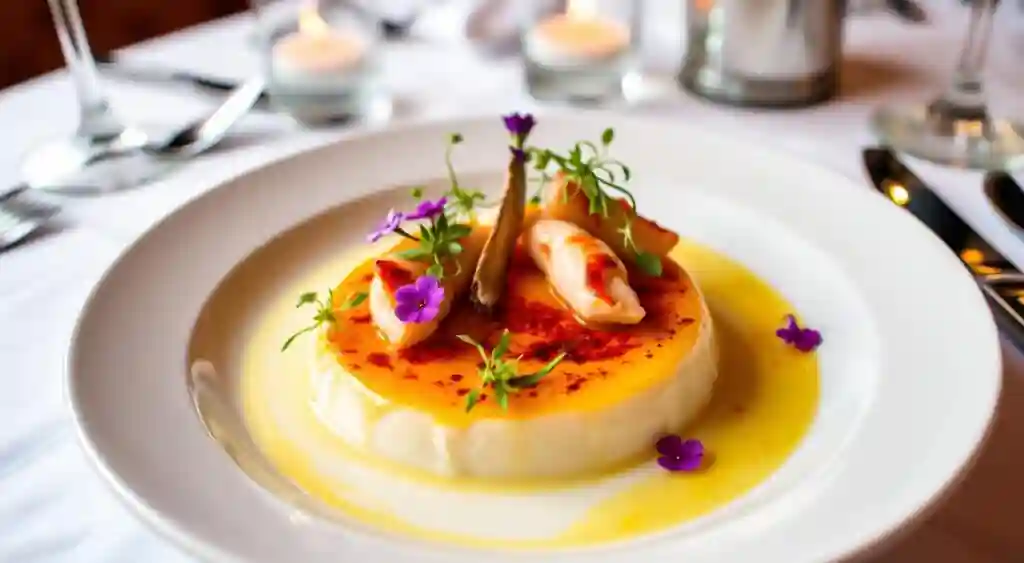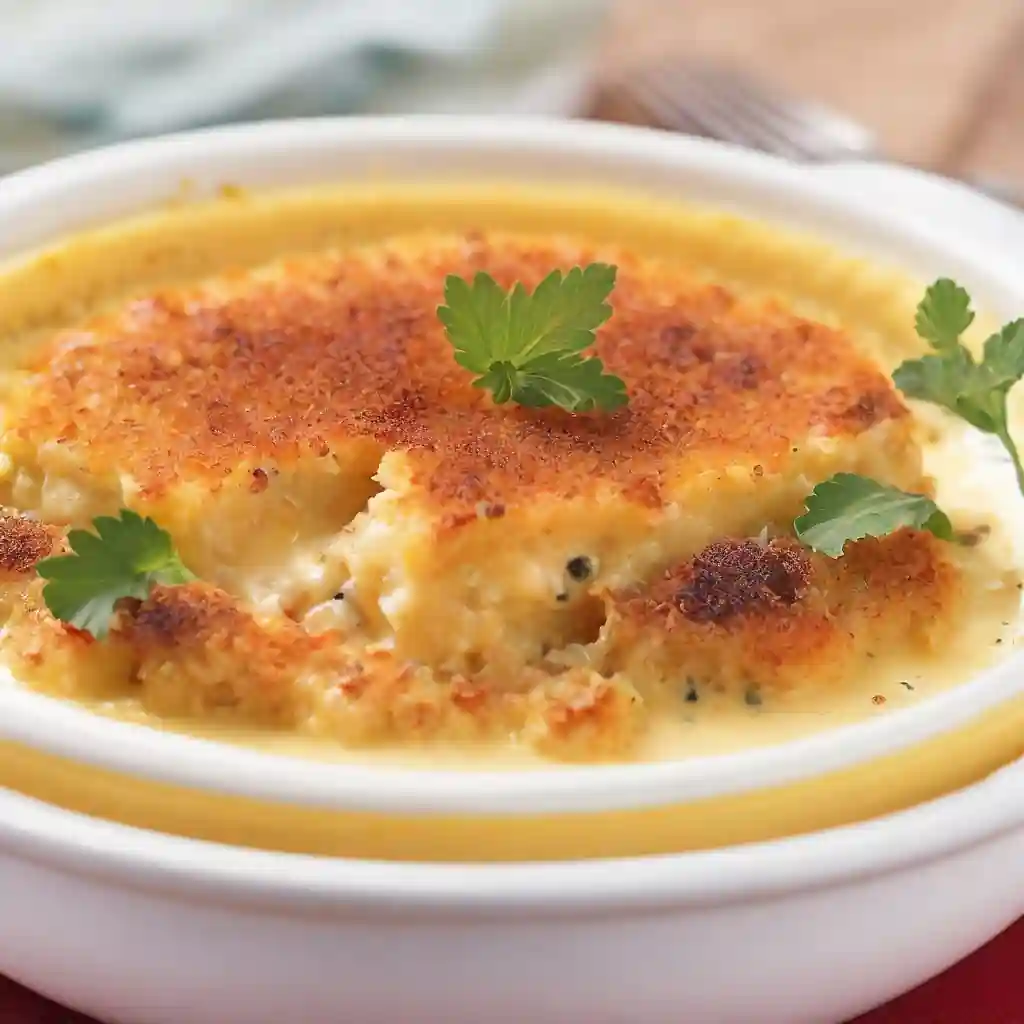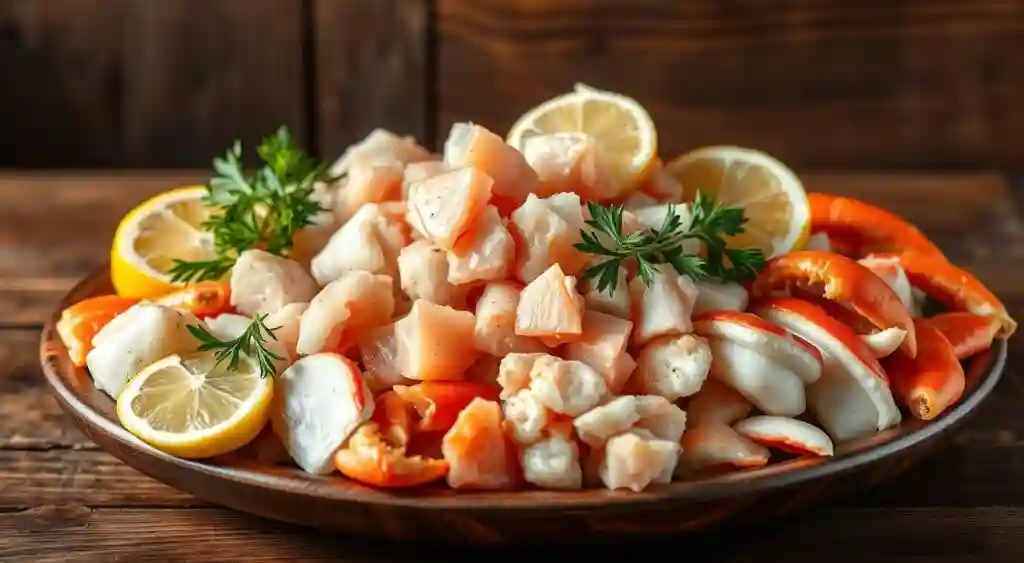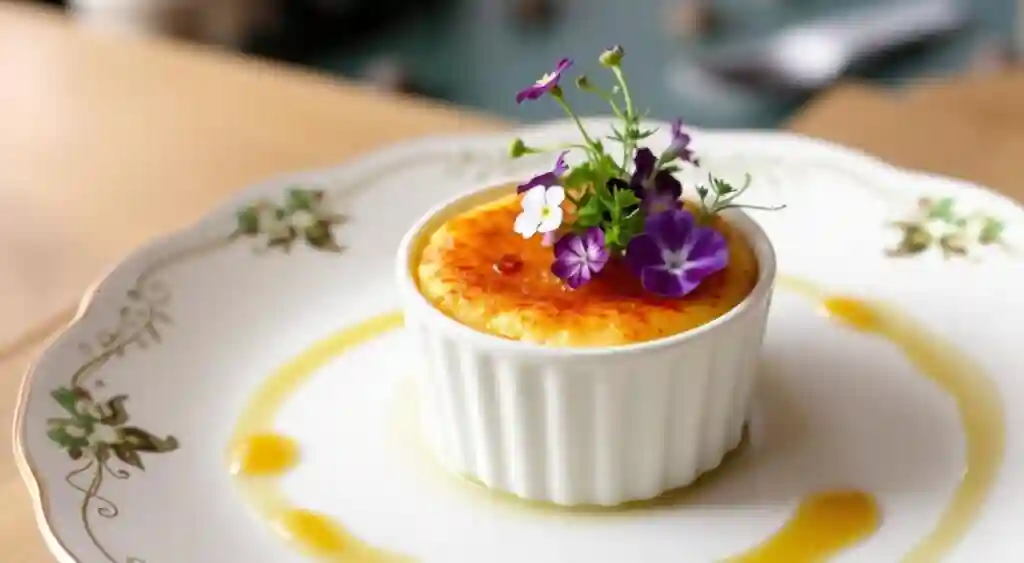Try this elegant Crab Brulee Recipe, blending sweet and savory flavors with a caramelized top. Discover the secrets to creating this indulgent seafood dish in the comfort of your kitchen.
Imagine a dish that combines the sweet taste of French desserts with the rich flavor of fresh crab. This crab brulee recipe is more than just a meal. It’s a culinary surprise that turns the classic crème brûlée into a savory delight.
As someone who loves seafood and cooking, I found that the perfect seafood creme brulee is an art. The creamy crab custard is a perfect mix of rich texture and exciting flavors. It will amaze even the toughest food critics.
This gourmet seafood dessert is a blend of French tradition and modern cooking. Every spoonful is a mix of sweet caramel and the salty taste of premium crab meat. It’s a true taste adventure.
Table of Contents
Key Takeaways
- Discover a unique fusion of sweet and savory culinary techniques
- Learn the art of creating a perfect custard with fresh crab meat
- Master the delicate balance of flavors in this innovative dish
- Explore a sophisticated twist on the classic crème brûlée
- Impress guests with a truly unexpected gourmet experience
Introduction to Savory Crab Brulee
Culinary innovation shines with the decadent crab dessert. It breaks new ground in flavors. Your taste buds are in for a thrilling ride through seafood brulee, blending French techniques with ocean-inspired creativity.

The crab custard dessert is a game-changer in gourmet cooking. Chefs around the world are mixing up classic dishes with bold new flavors. This challenges what we thought was possible in cooking.
The Evolution of Classic French Dessert
Crème brûlée has seen a major makeover. Seafood brulee is now a top trend, blending sweet and savory. It takes the classic custard and adds premium crab meat for a new twist.
- Origins rooted in French culinary techniques
- Innovative approach to classic dessert structures
- Seamless integration of seafood into traditional recipes
The Art of Combining Sweet and Savory
Making crab creme brulee is all about balancing flavors. Chefs pick ingredients that work well together. This lets the crab meat stand out in the creamy custard.
| Ingredient | Purpose | Flavor Profile |
|---|---|---|
| Lump Crab Meat | Primary Protein | Sweet, Delicate |
| Heavy Cream | Custard Base | Rich, Smooth |
| Granulated Sugar | Caramelized Topping | Crisp, Sweet |
What Makes This Dish Special
This dish takes your culinary journey to new heights. It’s more than a recipe; it’s a showcase of creativity, skill, and the endless possibilities of gourmet cooking.
“Cooking is an art, and innovation is its most exciting brushstroke.”
Whether it’s an elegant appetizer or a main course, this seafood brulee will surprise and delight. It’s perfect for those who love to explore new flavors.
The Origins and History of Crab Brulee
Explore the rich history of crab custard brulee, a dish that combines French dessert traditions with seafood. It all started in 17th-century France, where crème brûlée was first created.

The first crab custard brulee recipe was found in François Massialot’s 1691 book “Cuisinier royal et bourgeois”. This dish was a twist on the classic crème brûlée. Chefs then started adding seafood to it, making it even more special.
“Culinary innovation is about pushing the limits of tradition, exploring new possibilities, and reimagining what food can be.” – Unknown Chef
Coastal areas were key in making seafood custards. Chefs mixed fresh crab into the custard. This created a new dish that was both sweet and savory.
- 1691: First crème brûlée recipe documented
- 1980s: Crème brûlée gains widespread popularity
- Modern era: Fusion of traditional techniques with innovative ingredients
Crab dishes in fine dining evolved, turning this dessert into a fancy appetizer. By the 1980s, chefs were making new versions of old recipes. They were pushing the limits of what was possible in cooking.
| Era | Culinary Development |
|---|---|
| 17th Century | Classic Crème Brûlée Emerges |
| 1980s | Gourmet Experimental Techniques |
| Modern Day | Seafood Custard Innovations |
Now, crab custard brulee is a top example of culinary creativity. It mixes French cooking with seafood from around the world. It shows how chefs can turn old recipes into amazing dishes.
Essential Ingredients and Equipment
Making a great crab brulee needs careful attention and top-notch ingredients. This dish is all about fine details and quality. It’s a fancy seafood dish that will impress anyone.
Premium Crab Selection Guide
Your crab brulee starts with the best crab meat. For the finest crab appetizers, pick:
- Jumbo lump crab meat (1 tbsp per serving)
- Fresh, wild-caught crab
- Minimal processing
- Bright white, consistent texture

Dairy and Egg Components
The rich custard base needs the right dairy and egg ingredients:
- 16 oz heavy cream
- 3 egg yolks
- 1/4 cup sugar
- 1/2 tsp vanilla extract
- 1/4 tsp fish sauce (secret flavor enhancer)
Required Kitchen Tools
Professional cooking needs the right tools:
- Ramekins
- Kitchen torch
- Roasting tray
- Mixing bowl
- Whisk
“The right tools transform a good recipe into a culinary masterpiece.”
With quality ingredients and precise methods, your crab brulee will be a true masterpiece. It will be the best creamy crab dish you’ve ever had.
Understanding the Custard Base
Making the perfect custard base is key for elegant crab recipes, like crab creme brulee. It needs precision and a grasp of culinary science. This ensures a silky texture that goes well with the crab meat.
Upscale seafood recipes require careful attention, like when tempering eggs. This step is vital to avoid curdling and get a smooth texture. The trick is to slowly add hot cream to egg yolks, making a velvety base for your crab creme brulee.
“The perfect custard is a delicate dance of temperature and technique” – Culinary Experts
Key Components of an Perfect Custard Base
- Fresh egg yolks at room temperature
- High-quality heavy cream
- Precise temperature control
- Smooth whisking technique
When making your custard, focus on these key elements:
| Ingredient | Purpose | Recommended Quantity |
|---|---|---|
| Egg Yolks | Provides richness and structure | 4-6 yolks per cup of cream |
| Heavy Cream | Creates silky texture | 1-2 cups |
| Vanilla | Enhances flavor profile | 1 teaspoon pure extract |
Pro tip: Use a fine-mesh strainer for an ultra-smooth custard. It removes egg solids, making your crab creme brulee silky.
The perfect custard base balances flavors, letting the crab meat’s sweetness stand out. It also provides a rich, creamy base that will wow any food lover.
Crab Brulee Recipe: Step-by-Step Instructions
It transforms an ordinary dish into something truly special.
First, collect your ingredients with care. Use the freshest items to make this dish stand out.
Preparing the Custard Mixture
Begin with the crab boil recipe by following these steps:
- Separate 6 large egg yolks into a mixing bowl
- Whisk yolks gently until smooth and pale
- Add 450ml heavy cream at room temperature
- Incorporate 1 teaspoon of cognac for depth of flavor
- Season with ½ tsp salt, ¼ tsp black pepper, and ⅛ tsp nutmeg
Incorporating the Crab Meat
Now, add the crab meat. Mix 290g of fresh crab gently into the custard. This keeps the texture soft.
Handle the crab meat with care, like a precious treasure – gently fold it, don’t stir!
Baking Techniques and Tips
Getting the crab brulee right is all about precision:
- Preheat your oven to 160ºC/320ºF
- Prepare a water bath for even cooking
- Pour custard into ramekins
- Bake for 40 minutes until slightly jiggly
- Cool completely before caramelizing
Then, sprinkle 4 tablespoons of light brown sugar on top. Torch until golden. Your crab brûlée is all set to impress your guests and leave them craving more!
Mastering the Caramelization Process
Creating the perfect crème brulèe needs careful caramelization. The golden-brown crust turns a simple custard into a masterpiece. This is true, even with a creme brulee royal that includes delicate crab meat.
Professional chefs like Chef Amahri share tips for that perfect sugar top:
- Use turbinado sugar for the most consistent caramelization
- Ensure the sugar layer is thin and even
- Hold the kitchen torch 2-3 inches from the surface
- Move in slow, circular motions
When using a kitchen torch, look for these important signs:
| Caramelization Stage | Visual Indicator | Action |
|---|---|---|
| Initial Heating | Sugar begins to melt | Continue moving torch |
| Mid-Process | Sugar turns light amber | Maintain consistent motion |
| Final Stage | Dark golden-brown color | Remove heat immediately |
“Achieving the perfect caramelization is truly an art that takes time, patience, and a lot of practice.” – Chef Amahri
If you don’t have a kitchen torch, your broiler can be a great backup. Place the ramekins 2-3 inches from the heat. Watch closely to avoid burning.
Pro tip: Let the caramelized creme brulee rest for 2-3 minutes after torching. This allows the sugar to harden into a crisp shell.
Advanced Techniques for Perfect Texture
Creating a creamy crab appetizer is all about precision and technique. The seafood custard dish needs expert temperature control and careful preparation. This is to get the silky smooth texture of a classic creme brulee douja monde.
Temperature control is key when making your seafood custard. It’s important to keep the temperature steady. This allows the custard to set perfectly without getting too hot.
Precision Temperature Control Methods
- Use a water bath (bain-marie) to ensure even heat distribution
- Maintain oven temperature at 325°F (163°C)
- Use an instant-read thermometer to check internal temperature
Achieving Ideal Consistency
The texture of your crab brulee depends on careful preparation and cooking. You want a smooth, creamy consistency that feels like it melts in your mouth.
| Technique | Recommended Approach |
|---|---|
| Mixing | Gently fold ingredients to prevent air bubbles |
| Straining | Use fine-mesh strainer for ultra-smooth custard |
| Cooking Time | 30-35 minutes until edges are set but center is slightly jiggly |
“The secret to perfect texture is patience and precision” – Culinary Expert
Remember, chilling is important. Let your seafood custard dish chill for at least 2 hours. This helps it set and improves its flavor.
Flavor Enhancement and Seasoning Guide
Making the perfect baked crab entrée is all about finding the right balance of seasonings. These seasonings should bring out the crab’s natural sweetness. Your caramelized seafood topping needs careful thought to turn a simple dish into a work of art.
- Choose high-quality crab meat for the best taste
- Go for subtle seasonings that match seafood well
- Make sure flavors balance without overpowering the crab
Here are some seasoning mixes you might like:
| Seasoning | Flavor Profile | Recommended Amount |
|---|---|---|
| Old Bay Seasoning | Robust seafood blend | 1/2 teaspoon |
| Fresh Dill | Bright, herbal notes | 1 tablespoon, chopped |
| Cayenne Pepper | Subtle heat | Pinch |
“The secret to an exceptional crab brulee lies in understanding how to enhance, not mask, the crab’s natural flavor.” – Culinary Expert
Want to add more complexity? Try these optional flavor boosters:
- Citrus zest for brightness
- Truffle oil for earthiness
- Hot sauce for an unexpected kick
Remember, less is more. You want a mix that lets the crab’s sweetness shine while adding depth and intrigue.
Professional Presentation Tips
To make your crab dish look as good as it tastes, focus on presentation. A fancy crab dish needs a presentation that’s just as impressive.
Artful Plating Techniques
Start with smart plating to make your crab brulee unforgettable. Here are some tips to make it a true masterpiece:
- Use white porcelain plates to show off the golden top
- Make it stand out with slightly raised ceramic dishes
- Make sure the edges are clean and sharp when you move it
Elegant Garnishing Ideas
The right garnish can take your seafood dish from great to amazing. Try these ideas:
- Micro herbs like chervil or dill for a light touch
- Edible flowers like nasturtium or borage
- Citrus supremes for a burst of freshness
“Presentation is the first taste of the meal” – Renowned Chef Auguste Escoffier
When you serve your crab dish, timing is everything. Serve it right after caramelizing the top. This keeps the sugar crisp and the custard creamy. Your guests will love the care you put into it.
Final Presentation Tips
Your crab dish should be chilled, but the caramelized top should be at room temperature. Use a kitchen torch for a perfect golden crust. When you tap it with a spoon, it should crack beautifully.
Wine Pairing and Serving Suggestions
Take your indulgent seafood treat to the next level with the right wine pairings and serving tips. This elegant dinner party recipe needs thoughtful accompaniments that match its rich, creamy taste.
When picking wines for your seafood dishes, consider these top choices:
- Grande Récolte Rosé de Provence – A crisp, delicate wine that pairs well with crab flavors
- Cuvée Hermann Rosé de Provence – Adds to the dish’s luxurious feel
- Moscato – Perfect for balancing the savory custard with sweetness
Serving your Crab Brulee needs careful attention. Prepare it for 6 people, with a total time of 75 minutes for preparation and cooking.
| Serving Recommendation | Details |
|---|---|
| Portion Size | 4-6 oz per person |
| Chilling Time | 2-3 hours before serving |
| Recommended Temperature | Serve slightly chilled |
“The perfect wine can elevate a great dish, turning it into an unforgettable culinary journey”.
Pro tip for your elegant dinner party recipe: Chill the Crab Brulee in the fridge before serving to set the custard. Use shallow ramekins for a stunning caramelized sugar surface. This will wow your guests.
Troubleshooting Common Challenges
Making the perfect creamy crab bakes can be tough. Even skilled home cooks face issues with delicate crab recipes. Knowing the common problems helps you get better at baking crab.
Texture Challenges and Expert Solutions
Getting the right texture in crab recipes is all about precision. You might run into problems like:
- Grainy custard from bad egg tempering
- Runny or overcooked centers
- Uneven cooking in crab dishes
Experts offer these tips:
- Strain the custard before baking
- Try using egg yolks instead of whole eggs
- Use a precise water bath method
Caramelization Mastery
Caramelizing the top of creamy crab bakes needs skill. Chefs share these techniques for perfect caramelization:
| Issue | Solution |
|---|---|
| Uneven caramelization | Use white granulated sugar |
| Burnt sugar surface | Use a kitchen torch at medium heat |
| Inconsistent browning | Move torch consistently in circular motion |
“Patience takes a simple crab recipe and turns it into something truly extraordinary, elevating the whole culinary experience.” – Chef Raphael Francois
Practice is the best way to improve. Every try gets you closer to making amazing crab dishes. These dishes are sure to impress, even the pickiest of eaters.
Storage and Make-Ahead Tips
Preparing Crab Brulee is a big deal. It needs careful storage and planning. With the right steps, your dish stays fresh and full of flavor.
- Refrigerate it right after you make it
- Use containers that keep air out to stay fresh
- For the freshest flavor, enjoy it within two days.
- Keep the custard base and caramel topping separate
You can make the Crab Brulee base up to 48 hours ahead. Refrigeration is key to keeping your dish’s delicate texture.
| Storage Method | Duration | Recommended Action |
|---|---|---|
| Unbaked Custard Base | Up to 2 days | Refrigerate in sealed container |
| Fully Prepared Dish | 24 hours | Refrigerate, avoid reheating |
“Achieving perfection in coastal cuisines is all about capturing the subtle, delicate flavors and textures that make these dishes so special.” – Culinary Expert
Here are some tips for reheating and serving:
- Caramelize sugar topping just before serving
- Use a kitchen torch for best results
- Serve chilled or at room temperature
- Avoid microwaving to prevent texture breakdown
Your Crab Brulee will stay a stunning seafood delicacy with proper care.
Recipe Variations and Adaptations
Make your crab brulee recipe even better with new twists. Try different crab types to make it your own.
Crab Meat Variations
Choose from these tasty crab options for your brulee:
- Dungeness crab: Sweet and delicate
- Maryland blue crab: Rich and unique
- King crab: Luxurious texture and strong seafood flavor
Dietary Adaptations
Make the crab gratin fit your dietary needs:
- Gluten-free option: Use almond flour instead of breadcrumbs
- Low-fat version: Swap heavy cream for Greek yogurt
- Dairy-free alternative: Use coconut milk instead of cream
“The possibilities are endless when it comes to adding your own creative twist to classic recipes in the kitchen!” – Culinary Experts
Regional Flavor Inspirations
| Region | Unique Ingredient | Flavor Profile |
|---|---|---|
| Louisiana | Cajun Spices | Spicy and Bold |
| Mediterranean | Fresh Herbs | Fresh and Aromatic |
| Asian Fusion | Ginger and Sesame | Complex and Zesty |
For big parties, just multiply the ingredients. Always use fresh crab for the best taste. Try adding fresh chives, microgreens, or smoked paprika to make it your own.
Conclusion
Your journey to make the perfect Crab Brulee is more than a recipe. It’s a fun exploration of cooking creativity. You’ve learned to mix rich heavy cream, tasty crab meat, and a sweet caramel crust.
This dish is special because it combines savory and sweet flavors. The key is using top-notch ingredients like fresh crab. Don’t forget to add old bay seasoning for extra flavor.
Playing with textures and tastes is what makes this recipe magical. Try using different cheeses like parmigiano-reggiano or gruyère. Each choice adds a new story to your dish.
Every step, from whisking egg yolks to making the caramel crust, is important. It turns simple ingredients into a culinary masterpiece.
We encourage you to make this Crab Brulee your own. Share your creative ideas and kitchen stories. Your unique touch will make this dish unforgettable.
Your flair will turn this recipe into a special moment. It’s a tribute to the art of cooking, where creativity and skill come together to bring joy to every dish.
FAQ
What makes Crab Brulee different from traditional crème brûlée?
Crab Brulee is a twist on the classic dessert. It adds fresh crab meat to a creamy custard. This mix of crab and custard is topped with a caramelized sugar crust, unlike the sweet version.
What type of crab meat works best for this recipe?
Lump crab meat is the best choice. It’s the most delicate and sweet. Fresh Dungeness or Maryland blue crab are great options. Avoid imitation crab for a better flavor.
Can I make Crab Brulee in advance?
Yes, you can make the custard base and add crab up to 24 hours before. Keep it chilled. Caramelize the sugar just before serving for a perfect crust.
What equipment do I need to make Crab Brulee?
You’ll need ramekins, a torch for caramelizing, and a baking dish for the water bath. Also, mixing bowls, a whisk, and a kitchen thermometer are helpful.
How do I achieve the perfect caramelized sugar crust?
Use a kitchen torch to sprinkle sugar over the custard. Hold the torch 2 inches away and move it slowly. Look for a golden color and a slight crackling sound. If you don’t have a torch, use the broiler but be careful not to overheat.
Are there any common mistakes to avoid when making Crab Brulee?
Avoid overheating the custard, not tempering eggs properly, using low-quality crab, and rushing the caramelization. Use fresh ingredients and follow the recipe carefully for the best result.
What wines pair well with Crab Brulee?
Dry white wines like Chardonnay, Sauvignon Blanc, or Pinot Grigio pair well. They cut through the richness and highlight the crab flavor.
Can I make this recipe gluten-free or dairy-free?
Yes, use lactose-free cream or coconut cream and gluten-free ingredients. Be careful with substitutions to keep the flavor and texture right.
How long can I store Crab Brulee?
Store prepared Crab Brulee in the fridge for up to 2 days before caramelizing. Once caramelized, eat it immediately for the best crust. Always keep it in an airtight container and chilled.

